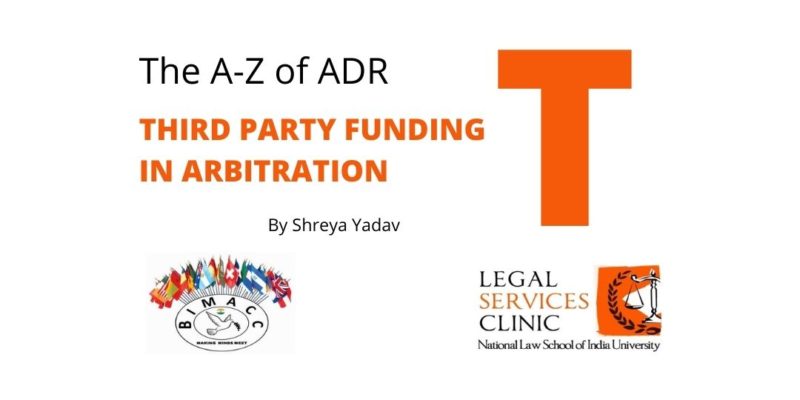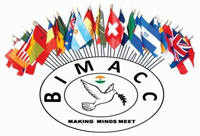
A-Z of ADR: Third-Party Funding in Arbitration
-Shreya Yadav (NLSIU Bangalore, Batch of 2020)
With arbitration being increasingly preferred to resolve commercial disputes, third-party funding [‘TPF’] has become a widely debated concept as a possible remedy for the excessive costs attached to the arbitral process. The costs in an arbitral process generally include fees of the arbitrators, expert fees, fees of the counsel, institutional fees, security costs, and other legal costs. However, unlike litigation wherein legal aid is a guaranteed right of the impecunious party to the claim to further the ideal of access to justice, no such formal mechanism exists as of now in the domain of arbitration. It is in this context that TPF assumes significance, as impecunious parties in an arbitral claim are propelled to seek external sources of funding to pursue their legitimate claims.[1] Amongst the current external funding options available such as loan, contingency fee, insurances, etc., TPF differs from them as it is a “financing method whereby an entity who is not a party to the dispute, without having any interest in the dispute funds the legal cost and others costs of the proceedings in consideration of certain percentage in the award.”[2] In other words, TPF or arbitral claims is a financing method, agreement or arrangement between a claimant and a funder, who is unrelated to the proceedings, pursuant to which the unrelated funder covers the cost of the proceedings (extent of cover depends on the terms of agreement) in lieu of a share (typically investment plus interest) in the award amount, if the claim is successful. However, if the claim fails, the funder is not entitled to recover anything instead might be required to cover the cost of the proceedings of the successful party.[3]
However, in addition to TPF attracting investment and facilitating greater access to justice, it has an ethical concern dimension to it as well.[4] Such strong economic interest of a third-unrelated party in the outcome of a claim, leads to independence and impartiality issues with respect to arbitrator and influences the privileged attorney-client relationship. Historically also, common law countries espoused the idea of opposing external funding in suits to avoid frivolous claims by relying on the doctrines of ‘champerty’ and ‘maintenance.’[5] Under these doctrines funding a suit without any interest per se in the outcome of the suit was considered unethical and was consequently prohibited. However, this approach has now been left behind by the same common law countries in the interest of “access to justice” and commercial prudence. TPF has now become a statutorily and judicially recognised feature of the arbitration in various jurisdictions like the UK,[6] Australia, Switzerland, France, Canada etc., and denied strict application of maintenance and champerty to arbitration. Even India’s Asian neighbours, Singapore[7] and Hong Kong[8] have also formally recognised and started regulating third-party funding to further encourage arbitration in their countries, though they continue to strictly regulate TPF in litigation. Regulation over strict prohibition of TPF in arbitration is increasingly gaining consensus in the international community as it is important to encourage and facilitate access to justice, however, protecting parties and integrity of the arbitral process against the strong economic interest of a third-unrelated party in the outcome of a claim is equally important. Making disclosure of TPF arrangements, securing the autonomy of the funded party, etc. have been some of the ways in which different states have responded to the potential pitfalls of TPF agreements in arbitration.[9] Thus, in order to ensure, that there is no conflict of interest, transparency with respect to who controls the “purse” is essential.
Legality of Third-Party Funding under the Indian Legal Framework
Despite the global trend of encouraging TPF in a regulated manner, India has lacked behind in adequately responding to this contemporary development. In India, neither the courts nor the legislature have specifically dealt with TPF agreements, leaving the domain to uncertainty at the cost of Indian parties involved in proceedings using external funding. Though there is no express rule, regulation, provision or precedent in the Indian legal framework which deals with TPF in arbitration proceedings, it is not sufficient to attract funders to fund India-seated arbitrations.[10] Further, India being a common law country concern of testing the validity TPF agreements vis-à-vis considerations for public policy doctrines such as maintenance and champerty before enforcing arbitral awards, add to the concerns of parties seeking such external funding.
Though, courts in India have since the case of Ram Coomar Coondoo v. Chunder Canto Mookerjee,[11] decided that agreements of maintenance and champerty are not void per se in India. That is, agreements of maintenance and champerty per se are not opposed to public policy as they were in England, rather agreements with “improper objects, gambling in litigation, or of injuring or oppressing others by abetting and encouraging unrighteous suits” are in violation of Indian public policy and they are unenforceable and void.[12] It was also opined that in the Indian Contract Act, 1872, which extensively deals with agreements that are void, the rule prohibiting Champerty and Maintenance was deliberately not introduced in India.[13] Thus, there remains only Section 23 of the Indian Contract Act concern, that is, if such funding agreements are against the public policy of India and thus, void. Subsequently, the Supreme Court too upheld the validity of third-party funders in litigation in the 1954 decision of G, Senior Advocate,[14] but excluded lawyers and contingent fee from the scope of valid source of external funding.[15] The apex court has reiterated the same position in the recent decision of Bar Council of India v. A.K. Balaji and Ors.[16] and observed that, “ In India, funding of litigation by advocates is not explicitly prohibited, but a conjoint reading of Rule 18 (fomenting litigation), Rule 20 (contingency fees), Rule 21 (share or interest in an actionable claim) and Rule 22 (participating in bids in execution, etc.) would strongly suggest that advocates in India cannot fund litigation on behalf of their clients. There appears to be no restriction on third parties (non- lawyers) funding the litigation and getting repaid after the outcome of the litigation.”
There has also been a growing consensus among members of the legal fraternity and business community that third-party funding in arbitration should be expressly permitted by the legislature as has been done for civil suits.[17] That is TPF in litigation has been recognised under Order XXV, Rule 3 of the Code of Civil Procedure, 1908 with respect to civil suits in States like Madhya Pradesh, Uttar Pradesh, Gujarat, and Maharashtra; it empowers the courts to implead third-party financiers to a dispute and collect “costs for litigation” from the funder. Thus, with no express prohibition on TPF in arbitration as well as recognition of such arrangement in litigation, it is not far-fetched to conclude that there is “passive” recognition of the validity of TPF in arbitration in India. However, to prevent abuse of the process from frivolous claims, effectively facilitating access to justice, it is imperative that the legislature formally institutionalises and regulates TPF at least for the first few years until the practice standards are developed and not leave regulation to the ambiguous domain of judicial interpretation of existing legal framework.
Concluding Remarks
Amidst
the global economic slowdown set in motion by the Covid-19 pandemic, it has and
would become difficult for parties to pursue their claims due to lack of liquid
financial resources required by arbitration. Thus, it is even more important to
“save arbitration from the arbitration cost”[18] in the
current scenario and not discourage parties from opting for arbitration. To
encourage parties to continue to opt for arbitration to resolve disputes as
well as to infuse confidence in the foreign investors and parties to opt for
India as the seat of arbitration, TPF can be a viable solution. The
legislature, thus, should meaningfully engage with TPF in arbitration
proceedings and provide a legal framework to balance the right of parties to
seek external funding in order to pursue their legitimate claim with the
integrity of the arbitral process such that the award can be enforced and
issues of confidentiality, conflict of interest, party autonomy etc. are
adequately dealt with at the initial stage itself.
[1] International council for Commercial Arbitration, Report of the ICCA-Queen Mary Task Force on Third-Party Funding in International Arbitration 4 (2018).
[2] Niccolo Landi, Third Party Funding in International Commercial Arbitration – An Overview, Austrian Yearbook on International Arbitration, 2012. The Revised 2014 IBA Guidelines on Conflicts of Interest in International Arbitration define ‘third-party funder’ in Explanation to General Standard 6 to as “any person or entity that is contributing funds, or other material support, to the prosecution or defence of the case and that has a direct economic interest in, or a duty to indemnify a party for, the award to be rendered in the arbitration.”
[3] Lisa Bench Nieuwveld and Victoria Shannon Sahani, Third-Party Funding in International Arbitration (Kluwer Law International , 2nd ed., 2017).
[4]Valentina Frignati, Ethical implications of third-party funding in international arbitration, Arbitration International, 505-522, 2016 available at https://doi.org/10.1093/arbint/aiw011.
[5] In Giles v. Thompson (1993) 3 All ER 321, Lord Justice Steyn defined these terms as follows: “In modern idiom maintenance is the support of litigation by a stranger without just cause. Champerty is an aggravated form of maintenance.”
[6] Arkin v Borchard Lines Ltd & Ors [2005] EWCA Civ 65. See Criminal Law (Amendment) Act, 1967.
[7] Civil Law (Third-Party Funding) Regulations, 2017 No. S 68.
[8] Code of Practice For Third-Party Funding of Arbitration, G.N. 9048 (2018).
[9] William Stone, Third Party Funding in International Arbitration: A Case for Mandatory Disclosure?, Asian Dispute Review, 2015.
[10] D Yeoh, Third Party Funding in International Arbitration: A Slippery slope or levelling the playing field?, Journal of International Arbitration, 2016.
[11] Ram Coomar Coondoo v. Chunder Canto Mookerjee, 1876 SCC OnLine PC 19.
[12] Kunwar Ram Lal v. Nil Kanth, 1893 SCC OnLine PC 7.
[13] In Giles v. Thompson (1993) 3 All ER 321.
[14] In re G. Senior Advocate, AIR 1954 SC 557.
[15] In re G. Senior Advocate, AIR 1954 SC 557.
[16] Bar Council of India v. A.K. Balaji and Ors., 2018 SCC Online SC 214.
[17] Srikrishna Committee, Report of the High-Level Committee to Review the Institutionalisation of Arbitration Mechanism in India (2017).
[18] Union of India v. M/s Singh Builders Syndicate, (2009) 4 SCC 523.
-Shreya Yadav (NLSIU Bangalore, Batch of 2020)
Shreya Yadav is a recent graduate from the National Law School of India University (NLSIU), Bangalore.
BIMACC expresses its gratitude towards the author and to the members of the Legal Services Clinic, National Law School of India University (NLSIU) for their support in our collaborative efforts to promote ADR with this series titled “A-Z of ADR”. The purpose of this series is to increase the understanding of certain fundamental concepts of Alternative Dispute Resolution.
The Legal Services Clinic is a student-run committee that provides free legal services to the socially and the economically backward sections of the society who have difficulty accessing the judicial system. It also has a mandate of spreading legal awareness and providing free legal assistance to those who cannot afford it.
Website: www.legalservicesclinic.org/
Facebook: @legalservicesclinic
Email: lsc.nlsiu@gmail.com
Phone Number: 073586 73214
Disclaimer: The views and opinions expressed in this blog are those of the author and do not necessarily reflect the official policy or position of BIMACC, any of the members of the Board, or the empanelled neutrals. This blog is for informative purpose only and does not constitute legal advice in any manner whatsoever.
